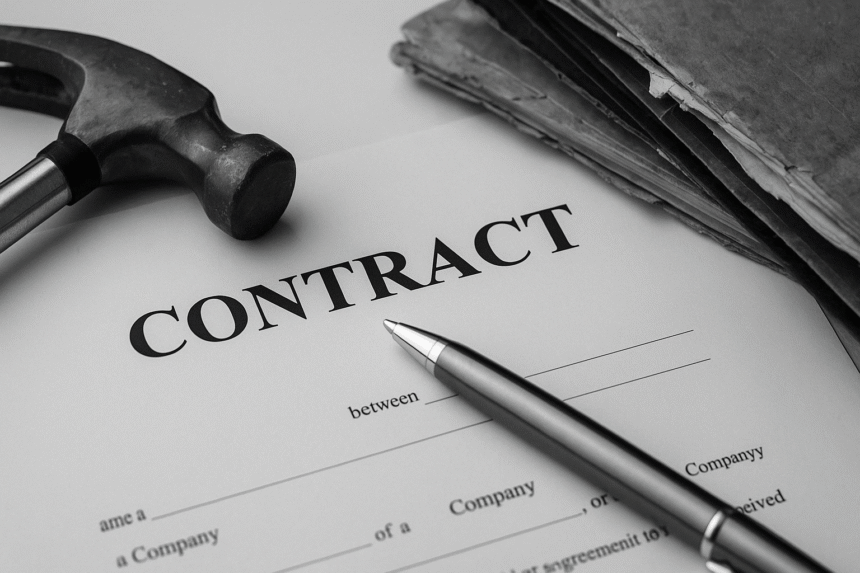When the Supplier Fails: What Contracts Can Do
In infrastructure, manufacturing, and logistics projects, everything hinges on timing. When a supplier fails to deliver—whether it’s a late shipment, defective materials, or complete abandonment—it can cause a chain reaction of losses, delays, and even legal disputes. That’s why having clear and enforceable terms is essential. The contract is your strongest shield when things go wrong.
In this post, we explore how to use contractual protections against supplier failure to reduce business risk, maintain project momentum, and preserve your rights. Whether you’re a contractor, project owner, or procurement officer, this guide will show you what your contracts should include.
Why Supplier Failures Happen
Before we dive into legal solutions, it’s important to understand the common reasons why suppliers fail:
- Cash flow problems that halt operations
- Labor shortages or unexpected resignations
- Regulatory issues (such as customs holds or import bans)
- Geopolitical disruptions, natural disasters, or pandemics
- Underestimating project complexity or cost
While some causes are unavoidable, contracts can minimize your exposure and provide options.
Key Clauses to Protect Against Delivery Delays
Late deliveries are the most common form of supplier failure. Even a few days’ delay can create costly disruptions in construction, product launches, or government compliance.
Contract Clauses That Help:
- Delivery Schedule with Time is of the Essence Clause: Makes deadlines legally binding
- Liquidated Damages: Pre-agreed penalties for each day or week of delay
- Milestone Payments: Link payments to progress stages, not time alone
- Termination for Delay: Allows cancellation if the delay exceeds a defined period
Include a buffer in your planning—but also keep legal teeth in the contract.
Substitution Rights and Force Majeure Provisions
Sometimes suppliers don’t fail maliciously—they’re just hit by unforeseen circumstances. Still, the project must go on.
Substitution Clauses:
- Allow the buyer to source products or services elsewhere if the supplier cannot perform
- Should define who bears the extra cost (often the defaulting party)
Force Majeure Clauses:
- Excuse performance in events beyond the supplier’s control (wars, natural disasters, etc.)
- Must list specific events and required notice periods
- Should require prompt communication and efforts to minimize impact
Inserting a force majeure mitigation clause is a smart move—it compels the supplier to reduce the damage, not just claim exemption.
Dispute Resolution and Claim Procedures
When supplier failure leads to disagreement, having a clear dispute process avoids escalation.
Recommended Clauses:
- Notice and Cure Period: Supplier is given time to fix the issue before penalties apply
- Escalation Ladder: Internal discussions → Mediation → Arbitration
- Governing Law and Jurisdiction: Choose a neutral venue (e.g., Singapore, UAE, or English law)
- Dispute Timelines: Set deadlines for initiating and resolving claims
Proactive contracts often prevent disputes from reaching litigation.
Legal Remedies for Breach of Contract
If a supplier fails and refuses to resolve the issue, the injured party must seek remedies.
Common Legal Remedies:
- Termination of contract
- Claim for damages: Covering direct loss and sometimes lost profit
- Specific performance: Forcing the supplier to fulfill obligations (rare, but possible)
- Calling the performance guarantee: If secured by bank or insurance bond
- Step-in rights: Buyer may take over delivery or subcontract completion
Remedies must be detailed in the contract to avoid ambiguity in enforcement.
Real-Life Case Study: Infrastructure Project Supplier Failure
In a Middle Eastern waste treatment PPP, a subcontractor responsible for liner installation failed to show up after receiving an advance payment. The main contractor had to source a replacement urgently, incurring higher costs and delays.
The Solution:
- A back-to-back subcontract with the same penalty terms as the main DBOT agreement
- A performance guarantee that was partially recovered
- A termination clause that allowed immediate replacement
This case proves the power of solid contract architecture—without it, the project might have collapsed.
Conclusion
When suppliers fail, it’s often the contract that saves the day. Strong contractual protections against supplier failure are your best defense against cost overruns, missed deadlines, and reputational risk.
Whether it’s liquidated damages, substitution rights, or termination clauses, proactive contract design ensures that you stay in control—even when things go wrong. If you’re regularly dealing with critical supply chain partnerships, review your contracts now—before the next disruption hits.



Leave a Reply